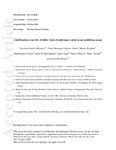Calcification is not the Achilles’ heel of cold‐water corals in an acidifying ocean
| dc.contributor.author | Rodolfo‐Metalpa, R | |
| dc.contributor.author | Montagna, P | |
| dc.contributor.author | Aliani, S | |
| dc.contributor.author | Borghini, M | |
| dc.contributor.author | Canese, S | |
| dc.contributor.author | Hall‐Spencer, JM | |
| dc.contributor.author | Foggo, Andrew | |
| dc.contributor.author | Milazzo, M | |
| dc.contributor.author | Taviani, M | |
| dc.contributor.author | Houlbrèque, F | |
| dc.date.accessioned | 2015-12-10T12:36:39Z | |
| dc.date.available | 2015-12-10T12:36:39Z | |
| dc.date.issued | 2015-06 | |
| dc.identifier.issn | 1354-1013 | |
| dc.identifier.issn | 1365-2486 | |
| dc.identifier.uri | http://hdl.handle.net/10026.1/3912 | |
| dc.description.abstract |
Ocean acidification is thought to be a major threat to coral reefs: laboratory evidence and CO2 seep research has shown adverse effects on many coral species, although a few are resilient. There are concerns that cold-water corals are even more vulnerable as they live in areas where aragonite saturation (Ωara) is lower than in the tropics and is falling rapidly due to CO2 emissions. Here, we provide laboratory evidence that net (gross calcification minus dissolution) and gross calcification rates of three common cold-water corals, Caryophyllia smithii, Dendrophyllia cornigera, and Desmophyllum dianthus, are not affected by pCO2 levels expected for 2100 (pCO2 1058 μatm, Ωara 1.29), and nor are the rates of skeletal dissolution in D. dianthus. We transplanted D. dianthus to 350 m depth (pHT 8.02; pCO2 448 μatm, Ωara 2.58) and to a 3 m depth CO2 seep in oligotrophic waters (pHT 7.35; pCO2 2879 μatm, Ωara 0.76) and found that the transplants calcified at the same rates regardless of the pCO2 confirming their resilience to acidification, but at significantly lower rates than corals that were fed in aquaria. Our combination of field and laboratory evidence suggests that ocean acidification will not disrupt cold-water coral calcification although falling aragonite levels may affect other organismal physiological and/or reef community processes. | |
| dc.format.extent | 2238-2248 | |
| dc.format.medium | Print-Electronic | |
| dc.language | en | |
| dc.language.iso | eng | |
| dc.publisher | Wiley | |
| dc.subject | calcification and dissolution | |
| dc.subject | Caryophyllia smithii | |
| dc.subject | cold-water corals | |
| dc.subject | Dendrophyllia cornigera | |
| dc.subject | Desmophyllum dianthus | |
| dc.subject | ocean acidification | |
| dc.title | Calcification is not the Achilles’ heel of cold‐water corals in an acidifying ocean | |
| dc.type | journal-article | |
| dc.type | Journal Article | |
| dc.type | Research Support, Non-U.S. Gov't | |
| plymouth.author-url | https://www.webofscience.com/api/gateway?GWVersion=2&SrcApp=PARTNER_APP&SrcAuth=LinksAMR&KeyUT=WOS:000353977500012&DestLinkType=FullRecord&DestApp=ALL_WOS&UsrCustomerID=11bb513d99f797142bcfeffcc58ea008 | |
| plymouth.issue | 6 | |
| plymouth.volume | 21 | |
| plymouth.publication-status | Published | |
| plymouth.journal | Global Change Biology | |
| dc.identifier.doi | 10.1111/gcb.12867 | |
| plymouth.organisational-group | /Plymouth | |
| plymouth.organisational-group | /Plymouth/Faculty of Science and Engineering | |
| plymouth.organisational-group | /Plymouth/Faculty of Science and Engineering/School of Biological and Marine Sciences | |
| plymouth.organisational-group | /Plymouth/PRIMaRE Publications | |
| plymouth.organisational-group | /Plymouth/REF 2021 Researchers by UoA | |
| plymouth.organisational-group | /Plymouth/REF 2021 Researchers by UoA/UoA07 Earth Systems and Environmental Sciences | |
| plymouth.organisational-group | /Plymouth/Research Groups | |
| plymouth.organisational-group | /Plymouth/Research Groups/Marine Institute | |
| plymouth.organisational-group | /Plymouth/Users by role | |
| plymouth.organisational-group | /Plymouth/Users by role/Academics | |
| dc.publisher.place | England | |
| dcterms.dateAccepted | 2014-12-18 | |
| dc.rights.embargodate | 2016-06-01 | |
| dc.identifier.eissn | 1365-2486 | |
| dc.rights.embargoperiod | 12 months | |
| rioxxterms.versionofrecord | 10.1111/gcb.12867 | |
| rioxxterms.licenseref.uri | http://www.rioxx.net/licenses/under-embargo-all-rights-reserved | |
| rioxxterms.licenseref.startdate | 2015-06 | |
| rioxxterms.type | Journal Article/Review |


